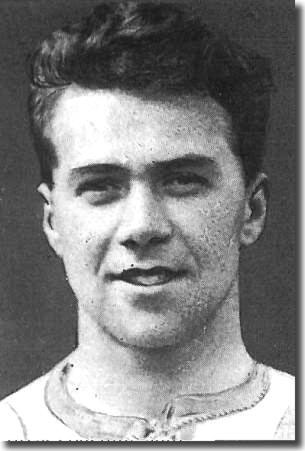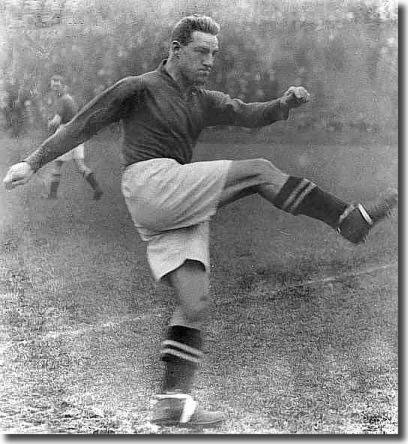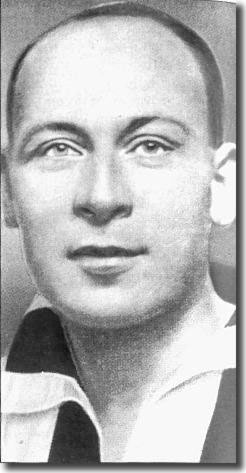 Leeds
United had secured promotion to the top flight after just four attempts.
Their predecessors, Leeds City had been unsuccessful in every one of their
ten completed seasons and promotion had started to resemble an impossible
dream to the ambitious board. Their choice of Arthur
Fairclough as manager had been vindicated and now, working alongside
his assistant Dick Norman, he sought to strengthen the team during the
summer in preparation for their first assault on the First Division.
Leeds
United had secured promotion to the top flight after just four attempts.
Their predecessors, Leeds City had been unsuccessful in every one of their
ten completed seasons and promotion had started to resemble an impossible
dream to the ambitious board. Their choice of Arthur
Fairclough as manager had been vindicated and now, working alongside
his assistant Dick Norman, he sought to strengthen the team during the
summer in preparation for their first assault on the First Division.
There were a number of departures, including goalkeeper Fred Whalley
and Jimmy Frew, who had been succeeded at left-back by Bill Menzies, but
there were a host of newcomers, including goalkeeper Bill Moore, forwards
James Clark, Jock Thom, Cuthbert Robson, John Martin, Frank Mears and
Fred Graver, half-backs Josh Atkinson and Tom Duxbury and full-back Jim
Kirkpatrick. Of these, however, only Robson and Atkinson made any impact.
In general, it was business as usual at the back with Bert Duffield,
Ernie Hart and Jim Baker holding down the key spots for most of the time
alongside Menzies, but they were understandably not as effective in the
top division, conceding some 61 goals.
Life in the top flight could not have started with a more difficult challenge.
The first day of the season had Leeds at home, but the opposition was
one of the strongest teams in the country, Sunderland. The Wearsiders
had a long history of success at the top and the contrast between the
two sides could hardly have been starker. Leeds had
won the Second Division title on a shoestring and had little experience
of big time football in their ranks. Sunderland, with 45 years of history
and five league championships behind them, the most recent in 1922/23,
had invested £8,000 in new blood during the summer.
The West Yorkshire public flocked to Elland Road to see the start of
a new era, and the attendance of 33,722 was a club record for a league
match. The Yorkshire Post reported the day thus: 'A knowledge of
the training methods led to the expectation that United players would
lack nothing in physical fitness, but the speed and alertness of the whole
side and the incisive methods of the forwards astonished even the most
fervent admirer ... the Sunderland half-backs ... were overwhelmed by
the whirlwind attacks.'
A header from Swan, 'greeted with a wild celebration of enthusiasm',
gave Leeds an unexpected advantage, but the lead lasted just two minutes
before Sunderland equalised. There were no further goals and the result
was welcomed by Leeds fans as an indication they might just be able to
survive at the top end of the game. But even as the team savoured their
first point in the First Division football, their perennial financial
difficulties continued to undermine their ambitions, just as had been
the case for Leeds City.
After the match, the club began a 'Lend us a Fiver' campaign to urge
supporters and well wishers to help raise funds. Chairman J Hilton Crowther
had backed the club's cause heavily following his arrival from Huddersfield
Town, and Leeds United were indebted to him to the tune of £54,000. He
now wanted to step down from the role of  Chairman
and wanted £35,000 of his money back. Few could have grounds for
complaint, and a meeting that night was told, 'He has acted as a sort
of fairy godfather to this club ... if 7,000 rank and file supporters
interested in the maintenance of high class soccer subscribe a £5 note
each, then the problem would disappear.' Among those joining the appeal
were the MP for Leeds South East, James O'Grady, and Crowther's successor
in waiting, Major Albert Braithwaite, who was in cajoling mood. 'Unfortunately
many people appear to be oblivious to the obvious advantage of Leeds United
retaining the position they have won,' he said.
Chairman
and wanted £35,000 of his money back. Few could have grounds for
complaint, and a meeting that night was told, 'He has acted as a sort
of fairy godfather to this club ... if 7,000 rank and file supporters
interested in the maintenance of high class soccer subscribe a £5 note
each, then the problem would disappear.' Among those joining the appeal
were the MP for Leeds South East, James O'Grady, and Crowther's successor
in waiting, Major Albert Braithwaite, who was in cajoling mood. 'Unfortunately
many people appear to be oblivious to the obvious advantage of Leeds United
retaining the position they have won,' he said.
back to top
After the Sunderland game, even though they had home wins in September
over Preston 4-0 and Everton 1-0, by mid-October Leeds United had just
8 points from their 10 games and were firmly stuck in the bottom half
of the table. They were finding life at the top difficult. They did manage
three successive victories against Tottenham, Blackburn (a rare win away
from Elland Road) and West Ham in the fortnight leading up to 1 November,
but their run through to Christmas was pretty dismal - they picked up
just three points out of the next fourteen and the poor run culminated
with a 6-1 thrashing at Arsenal on 20 December.
A 6-1 thumping of Aston Villa on Christmas Day (including a hat trick
from Percy Whipp and two goals by Jack Swan) and a 4-1 win at Preston
on 17 January were two rare victories, but the side was in dire straits,
without another victory until the end of March. During this period, there
was defeat at the first time of asking in the FA Cup, this time by 3-0
away to Liverpool. Clearly action was required.
Manager Fairclough had never shirked difficult decisions when they were
required and brought in some new blood to stem the tide, enlisting big
name captures, Tom Jennings, Willis
Edwards and Russell Wainscoat during March.
23-year-old Jennings was an established goalscorer with Scotland's Raith
Rovers and achieved a prodigious strike rate during his years at Elland
Road - 112 goals in 167 League appearances. He was a determined striker,
heavy and strong. hard to knock off the ball and ferocious in the challenge.
Were it not for sporadic bouts of illness, Jennings might have scored
many more for Leeds.
Edwards had been making a name for himself as a rounded wing-half in
the Third Division (North) with Chesterfield and went on to serve Leeds
as a player for the next eighteen years, going on to win England caps.
He cost £1,500.
Wainscoat enjoyed a dream league debut, scoring a hat trick for Barnsley
against Fulham in Match 1920. He moved to First Division  Middlesbrough
for £4,000 in December 1923 and cost Fairclough £2,000. A
tall, broad shouldered inside-left, Wainscoat was a sharp, intelligent
player, creator and goalscorer, whose abilities were recognised by England
when he was capped against Scotland in 1929.
Middlesbrough
for £4,000 in December 1923 and cost Fairclough £2,000. A
tall, broad shouldered inside-left, Wainscoat was a sharp, intelligent
player, creator and goalscorer, whose abilities were recognised by England
when he was capped against Scotland in 1929.
The three players were signed within the space of a few days in March
and came into the team for the run-in along with Josh Atkinson, goalkeeper
David Russell, a January buy from Doncaster, and Indian forward John Armand.
Jack Swan was dropped, along with keeper Billy Down, who joined Doncaster
the following September, long-serving skipper Jim Baker and forward Joe
Richmond.
From the match on 21 March at Newcastle until the end of the season,
Atkinson, Edwards, Jennings and Wainscoat were ever present. The revolution
didn't start too well - they lost the Newcastle game 4-1, but then things
started to improve and United won four of their last eight games, including
an impressive 4-1 win over Liverpool who ended the season in fourth spot.
Jennings and Wainscoat both got three goals in that closing run and the
improvement was enough to see the club avoid relegation with an 18th place
finish. In the end they had eight points to spare on the relegation spots
but for a while it had been distinctly touch and go.
Nevertheless, Leeds had shown enough resilience at the death to give
supporters some optimism for the future.
Other Football Highlights from 1924/25
- Huddersfield's joy at retaining the league title was tempered within
a few weeks when their manager, former Leeds City boss Herbert
Chapman, decided to take the helm at Arsenal. It had been Chapman's
appointment in 1921 that had transformed Town from also-rans into one
of the most successful clubs in the country. In addition to their two
championships, they captured the FA Cup in 1922
- Having suffered the agony of losing the championship by two hundredths
of a goal the previous season, Cardiff lost the FA Cup final to Sheffield
United because of an error by their right-half Harry Wake. He hesitated
and allowed United's brilliant winger, Fred Tunstall, to score the only
goal of the game
- Arthur Chandler scored in 16 consecutive Second Division matches for
Leicester City, the champions. He also finished as the division's leading
scorer with 33 goals
- The decision to alter the offside rule by the International Board
in June 1925 changed the face of football forever. The rule change was
straightforward. From the 1925/26 season, instead of three men being
required to be between a player and the goal when the ball was passed,
only two would be necessary. The intention was to cut down on the number
of offside decisions and to prevent sterile defensive play. Matches
with 40 offside decisions had become commonplace. Newcastle, with their
two international full-backs, Bill McCracken and Frank Hudspeth, had
made an art form of a canny offside trap












 Leeds
United had secured promotion to the top flight after just four attempts.
Their predecessors, Leeds City had been unsuccessful in every one of their
ten completed seasons and promotion had started to resemble an impossible
dream to the ambitious board. Their choice of Arthur
Fairclough as manager had been vindicated and now, working alongside
his assistant Dick Norman, he sought to strengthen the team during the
summer in preparation for their first assault on the First Division.
Leeds
United had secured promotion to the top flight after just four attempts.
Their predecessors, Leeds City had been unsuccessful in every one of their
ten completed seasons and promotion had started to resemble an impossible
dream to the ambitious board. Their choice of Arthur
Fairclough as manager had been vindicated and now, working alongside
his assistant Dick Norman, he sought to strengthen the team during the
summer in preparation for their first assault on the First Division. Chairman
and wanted £35,000 of his money back. Few could have grounds for
complaint, and a meeting that night was told, 'He has acted as a sort
of fairy godfather to this club ... if 7,000 rank and file supporters
interested in the maintenance of high class soccer subscribe a £5 note
each, then the problem would disappear.' Among those joining the appeal
were the MP for Leeds South East, James O'Grady, and Crowther's successor
in waiting, Major Albert Braithwaite, who was in cajoling mood. 'Unfortunately
many people appear to be oblivious to the obvious advantage of Leeds United
retaining the position they have won,' he said.
Chairman
and wanted £35,000 of his money back. Few could have grounds for
complaint, and a meeting that night was told, 'He has acted as a sort
of fairy godfather to this club ... if 7,000 rank and file supporters
interested in the maintenance of high class soccer subscribe a £5 note
each, then the problem would disappear.' Among those joining the appeal
were the MP for Leeds South East, James O'Grady, and Crowther's successor
in waiting, Major Albert Braithwaite, who was in cajoling mood. 'Unfortunately
many people appear to be oblivious to the obvious advantage of Leeds United
retaining the position they have won,' he said. Middlesbrough
for £4,000 in December 1923 and cost Fairclough £2,000. A
tall, broad shouldered inside-left, Wainscoat was a sharp, intelligent
player, creator and goalscorer, whose abilities were recognised by England
when he was capped against Scotland in 1929.
Middlesbrough
for £4,000 in December 1923 and cost Fairclough £2,000. A
tall, broad shouldered inside-left, Wainscoat was a sharp, intelligent
player, creator and goalscorer, whose abilities were recognised by England
when he was capped against Scotland in 1929.